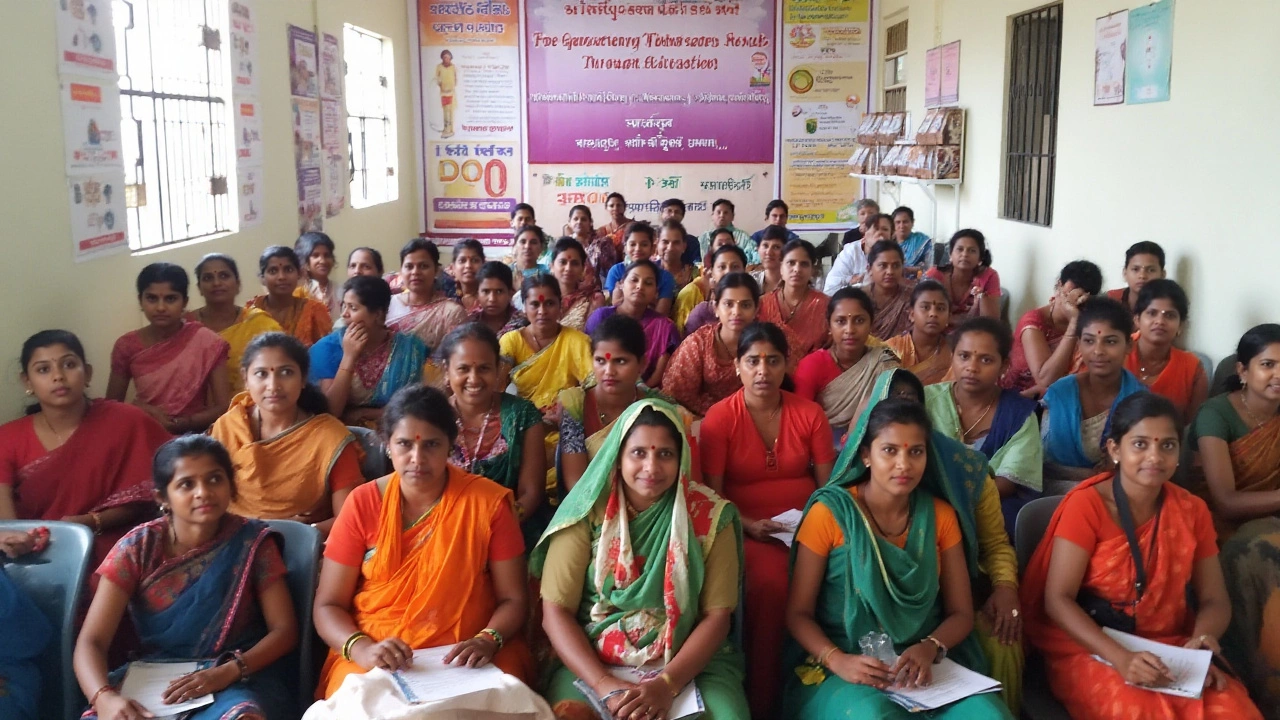Menopause is a natural biological process that can bring a range of uncomfortable symptoms like hot flashes and mood changes. Though it's a part of aging, finding ways to ease the transition is crucial for many women. Hormone therapy, particularly using estrogen, is a widely adopted method to alleviate these symptoms.
In India, recognizing the importance of women's health and well-being, the government has introduced various schemes to support women going through menopause. These schemes not only aim to provide relief but also education on managing the transition effectively.
This article delves into the hormone primarily used to tackle menopause symptoms, outlines related government initiatives, and shares practical tips for managing the experience naturally. Whether you're directly affected or supporting someone who is, understanding these solutions can make a world of difference.
- Understanding Menopause and Symptoms
- Hormone Therapy: The Role of Estrogen
- Government Schemes Supporting Women's Health
- Tips for Managing Menopause Naturally
Understanding Menopause and Symptoms
Menopause is a pivotal phase in a woman's life, marking the natural end of reproductive years. While it's a universal transition, each woman's experience can be strikingly different. Menopause typically occurs between the ages of 45 and 55, although it can present earlier or later. This period is characterized by a significant decrease in estrogen and progesterone, which are essential hormones for regulating not only menstrual cycles but also various bodily functions. As these hormone levels drop, women can experience a plethora of symptoms, some of which can significantly impact daily life and overall well-being.
Among the most common symptoms are hot flashes, which are sudden feelings of intense heat that can occur at any time, often leaving women drenched in sweat and feeling uncomfortable. Mood swings are another frequent issue, as fluctuating hormone levels can lead to irritability, anxiety, and even depression. Sleep disturbances are also prevalent, with insomnia being a major concern for many, driven by night sweats or general restlessness. The physiological changes don't stop there; women might notice weight gain, particularly around the abdomen, and a slowdown in their metabolism.
Moreover, the lowering of estrogen can lead to vaginal dryness, which can make sexual intercourse uncomfortable, leading to a decrease in sexual desire for some. Research indicates that about 50% of women report experiencing these symptoms during the menopausal transition. Cognitive changes such as forgetfulness and difficulty concentrating are reported as well, although reversible over time. The decline in bone density due to reduced estrogen is another concern, increasing the risk of osteoporosis and fractures. Understanding these symptoms is crucial for effectively managing menopause and recognizing when to seek medical advice.
According to the North American Menopause Society, "Menopause is a natural life transition, not a disease, but that doesn’t mean you have to suffer in silence." Indeed, awareness and proactive management of menopause can significantly alleviate its impact on life. It's essential for women to educate themselves and seek support, whether through health professionals, peer groups, or through government schemes designed to aid in easing this transition. Understanding your body's changes and having a plan can make this time less daunting and more manageable.
To encapsulate the typical experiences, we can refer to an interesting study on Indian women, which revealed that while many women in India undergo menopause earlier compared to their Western counterparts, awareness about menopause and its effects is considerably low. This spans not only personal health impacts but also the socio-economic factors influenced by menopause. The government schemes in India aim to not only fill this knowledge gap but also provide medical support and community resources to address these challenges holistically. This initiative is aligned with global efforts to support women's health and ensure a smoother transition through menopause.

Hormone Therapy: The Role of Estrogen
In the landscape of menopause relief, estrogen hormone therapy stands as a beacon of hope for many women battling the discomforts of this natural transition. Estrogen plays a crucial role in regulating menstruation and its decline is directly linked to menopause. During this phase, symptoms such as hot flashes, night sweats, and mood swings can become frequent companions, significantly impacting daily life. Hormone therapy, often referred to as Hormone Replacement Therapy (HRT), involves the administration of estrogen to replace the dwindling levels, easing these symptoms.
The application of estrogen in hormone therapy isn't just a one-size-fits-all solution. There are different forms available, which include pills, patches, gels, and creams, each offering unique benefits based on a woman's health profile and preference. Pills are the most common form, offering systemic relief, while patches release estrogen directly into the bloodstream, bypassing the digestive system, which can be advantageous for those sensitive to oral medication. Gels and creams provide options for localized application, often recommended for those with specific symptom targets.
It is essential to consider the potential risks involved with HRT. Studies have shown that long-term use of estrogen therapy can increase the risk of certain health issues, such as breast cancer and cardiovascular disease. Therefore, discussing these options with healthcare providers is crucial to tailor the treatment to individual needs, balancing benefits against risks. It's a partnership between the patient and the doctor, aiming to find the most effective way to alleviate menopause symptoms while safeguarding long-term health. In this approach, some women opt for combination therapy, which includes both estrogen and progesterone, to further mitigate certain risks.
"Estrogen therapy remains a cornerstone for menopause symptom management, with its efficacy well-documented across decades," notes Dr. Lisa Mosconi, a leading researcher in women's brain health.
Alongside traditional hormone therapies, there's a growing interest in bioidentical hormones, which closely mimic the body's natural hormones. These bioidentical hormones are synthesized from plant estrogens. While they are often touted as being more 'natural,' it's important to recognize that their effects are similar to conventional HRT, requiring careful oversight and prescription from healthcare professionals.
In India, accessibility to hormone therapy is increasingly supported by healthcare policies aimed at improving women's health. Awareness and availability are key, ensuring that those who need these therapies can obtain them without excessive financial burden. It's through this initiative that hormones like estrogen can continue to offer relief to numerous women, helping them maintain quality of life during menopausal years.
| Form | Method | Advantages |
|---|---|---|
| Pill | Oral | Systemic relief, widely available |
| Patch | Transdermal | Avoids digestive system, steady delivery |
| Gel/Cream | Topical | Localized application, specific targeting |
Ultimately, the goal of incorporating estrogen in hormone therapy is to restore balance in the body, easing the transition through menopause. While it might not be suitable for every woman, knowing the options and understanding individual needs can empower women to make informed health decisions. Hormone therapy continues to evolve, with research and clinical trials ongoing, promising further advancements in the ways we manage menopause, making life a little more comfortable for women worldwide.

Government Schemes Supporting Women's Health
The Indian government has long recognized the importance of women's health, particularly during pivotal life stages such as menopause. As this phase often brings both physical and emotional challenges, numerous initiatives have been launched to ensure women receive adequate support. These government schemes not only focus on medical treatment but also emphasize education and awareness. This dual approach ensures that women are equipped with the necessary knowledge to make informed health decisions.
One notable initiative is the National Health Mission (NHM), which aims to provide accessible and affordable healthcare to women across rural and urban sectors. Within this mission, special attention is given to menopausal health, ensuring that women have access to hormone therapy and other essential treatments. Regular workshops and seminars are organized under NHM to educate women on managing menopause symptoms and the benefits and risks of using hormone therapy, especially estrogen.
In addition to NHM, the Rashtriya Swasthya Bima Yojana (RSBY) extends health insurance coverage to vulnerable families, allowing women to access necessary healthcare services without financial strain. This insurance scheme significantly increases the availability of healthcare resources for women undergoing menopause by covering hospital expenses related to hormone therapy and other treatments. By removing economic barriers, RSBY empowers women to seek the care they need at a crucial time in their lives.
Furthermore, the government's emphasis on women’s health extends to the educational front with initiatives such as the National Program for Health Care of the Elderly (NPHCE). This program not only targets the elderly population but also provides age-specific health care for older women experiencing menopause. Information sessions conducted under NPHCE provide much-needed insights into menopause management, thus enhancing the quality of life for many women.
The Impact of These Schemes
These initiatives exemplify how strategic government intervention can significantly enhance access to healthcare and improve outcomes for women. By bridging the gap between awareness and access, these schemes enable women to tackle menopause with the right blend of medical intervention and self-care. According to a report by the Ministry of Health, more than 70% of women utilizing these health schemes report improved management of menopause symptoms, indicating a positive impact on their day-to-day lives.
"The scope of these health initiatives is crucial in determining how well women manage menopause in our country," highlights Dr. Anjali Sharma, a leading gynecologist based in Delhi, during an interview on health care policies. "By integrating education and healthcare, we're empowering women to make informed choices about their bodies and well-being."
As we move forward, it remains pivotal to expand and refine these initiatives, ensuring they cater to the evolving needs of women across different demographics. Community involvement and continued government backing are essential to sustain the positive impact of these schemes on women's health. Through continued advocacy and support, India sets a benchmark in ensuring that menopause is merely a phase — not a hurdle — in a woman’s life journey.

Tips for Managing Menopause Naturally
Managing menopause symptoms naturally is becoming an increasingly popular approach among women who want to avoid or complement hormone therapies. The key is to focus on lifestyle modifications that not only provide relief from symptoms but also enhance overall health. Many women find that regular exercise plays a significant role in easing symptoms such as mood swings and insomnia. Engaging in physical activities like walking, yoga, or swimming enhances mood-elevating endorphins and reduces stress, which can be a trigger for hot flashes and night sweats. Additionally, maintaining a balanced diet rich in calcium and vitamin D can support bone health, another crucial aspect to consider during menopause.
Dietary adjustments can also make a marked difference. Incorporating more plant-based foods like soy, flaxseeds, and legumes has been shown to have a positive impact. These foods contain phytoestrogens, naturally occurring plant compounds that mimic the effects of estrogen in the body, which can potentially reduce hot flashes and balance hormones. It's also beneficial to avoid triggers such as caffeine, alcohol, and spicy foods, which might exacerbate symptoms. Staying hydrated and eating meals at regular intervals can help maintain energy levels and prevent weight gain. An emphasis on nutritious meals with whole grains, fruits, and vegetables can lead to better management of menopause.
Another natural approach often overlooked is stress management. Techniques such as meditation, deep breathing exercises, and tai chi can foster relaxation and provide a sense of calm during turbulent emotional shifts. Taking time for mindfulness practices daily can improve mental clarity and emotional stability. Some women find solace in creative outlets such as writing, painting, or music which provides a soothing escape and a form of self-expression.
An interesting statistic from the North American Menopause Society highlights that around 75% of women experience hot flashes during menopause. While these natural methods may not eliminate symptoms entirely, they can significantly reduce their frequency and severity, thus improving quality of life. Sleep hygiene is another pivotal factor; ensuring a comfortable sleep environment by lowering the room temperature and utilizing cooling pillows can combat night sweats, leading to more restful nights. Establishing a regular sleep schedule and limiting screen time before bed also promotes better sleep patterns.
Complementary therapies like acupuncture and herbal supplements have gained traction as well. Research indicates that herbs such as black cohosh and red clover may offer some relief, although it is crucial to consult with healthcare providers before starting any new supplement. It's worth noting that what works best can vary significantly from one person to another. Thus, being open to experimentation within safe parameters is advisable. In the words of Dr. JoAnn E. Manson, chief of preventive medicine at Brigham and Women's Hospital, "Tailoring menopause management to each individual's symptoms provides the most comfort and most effective relief."

